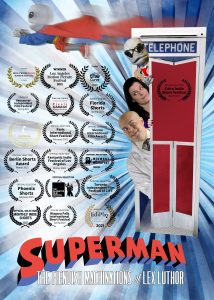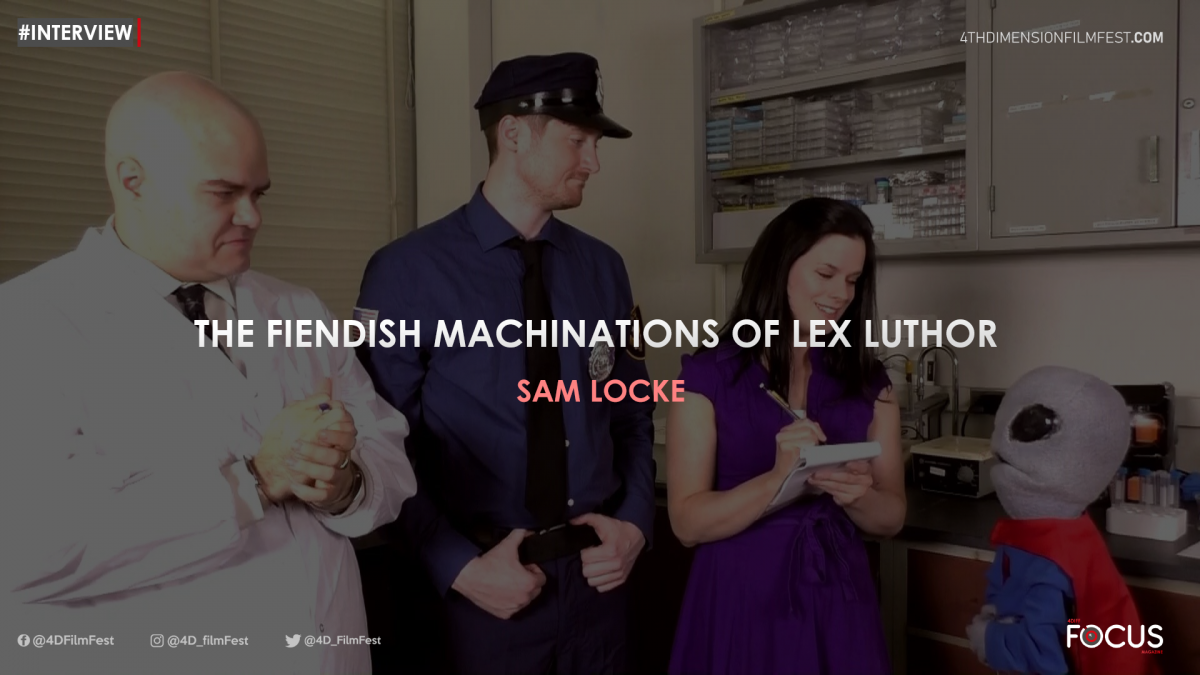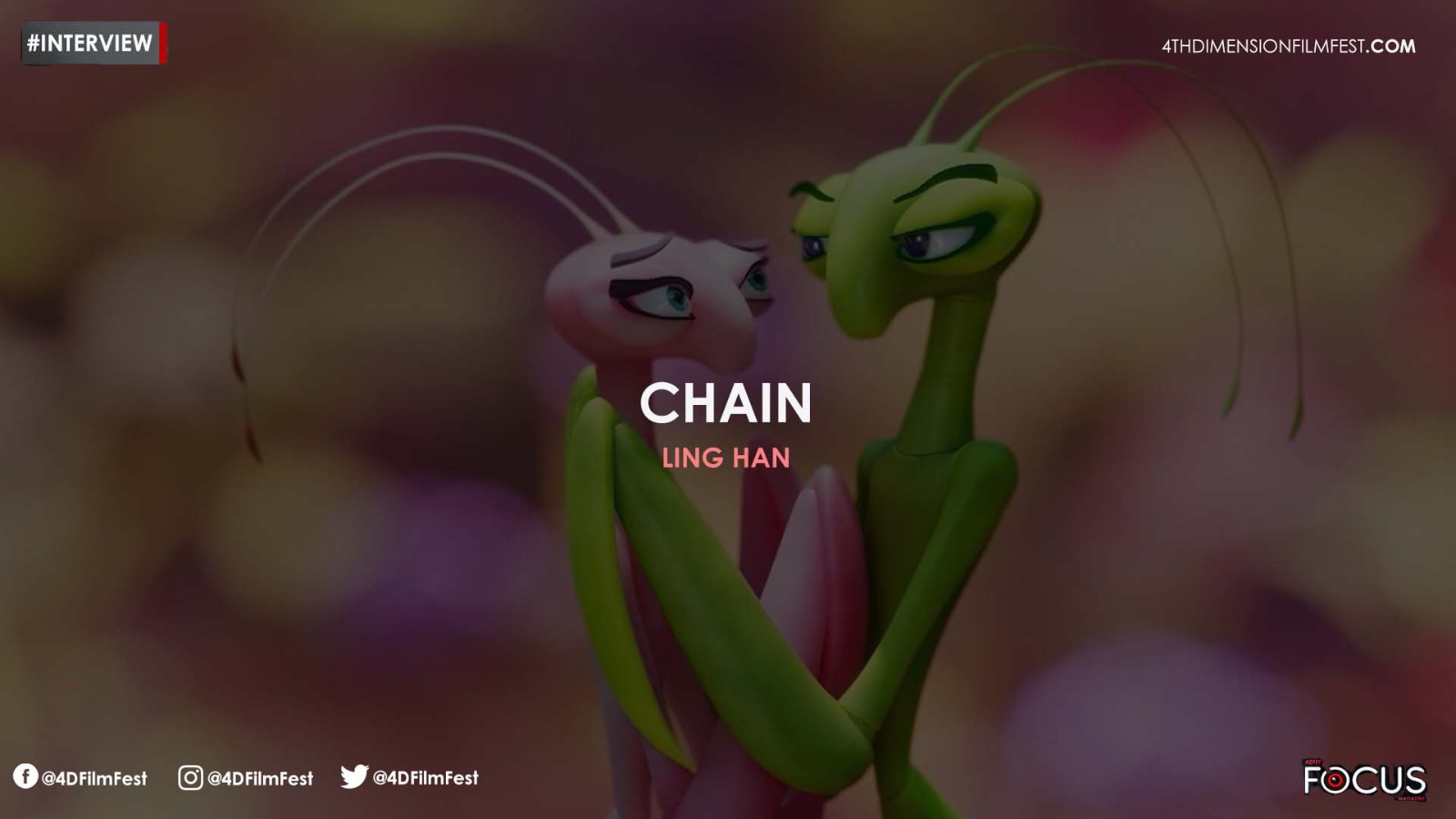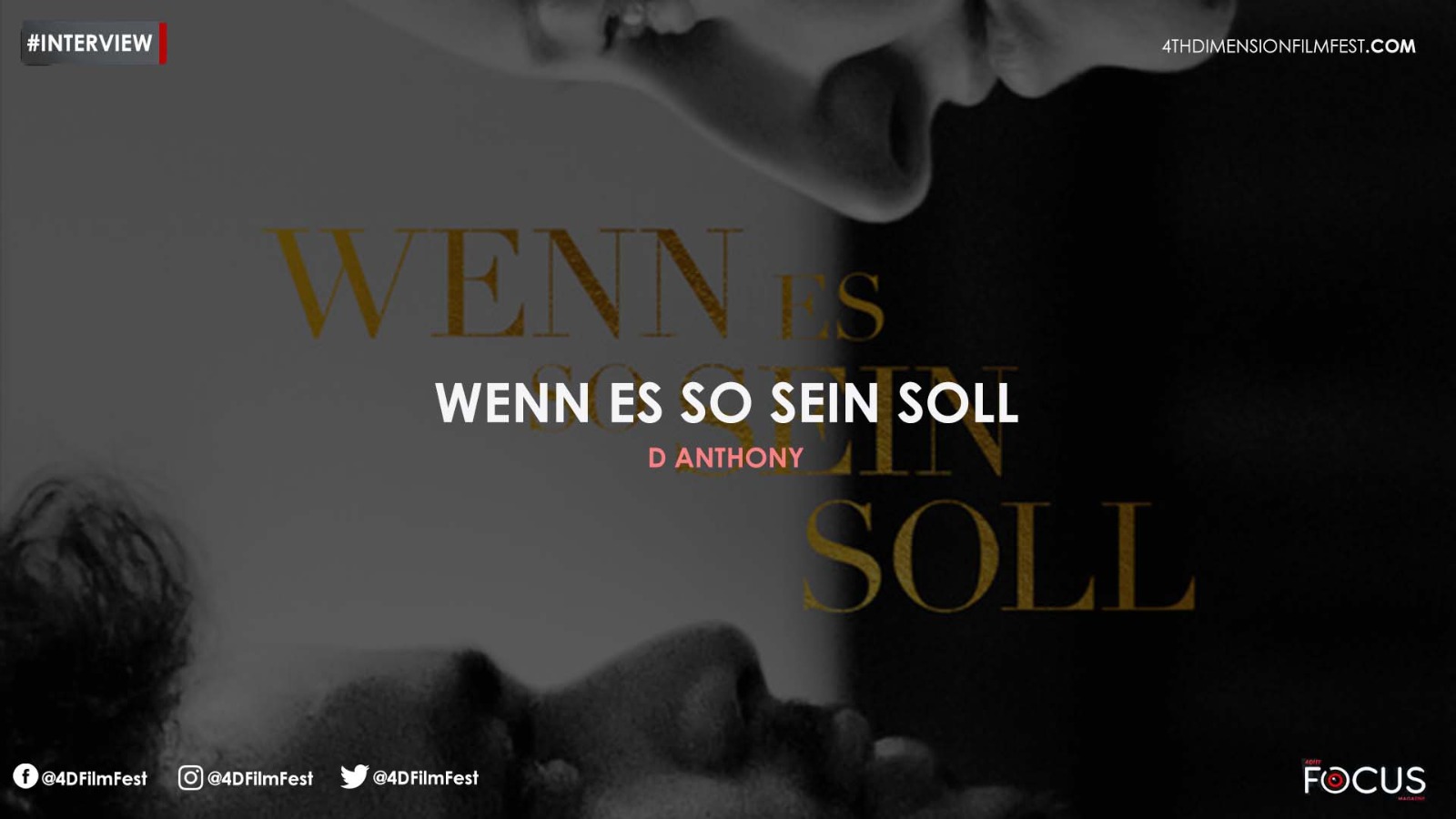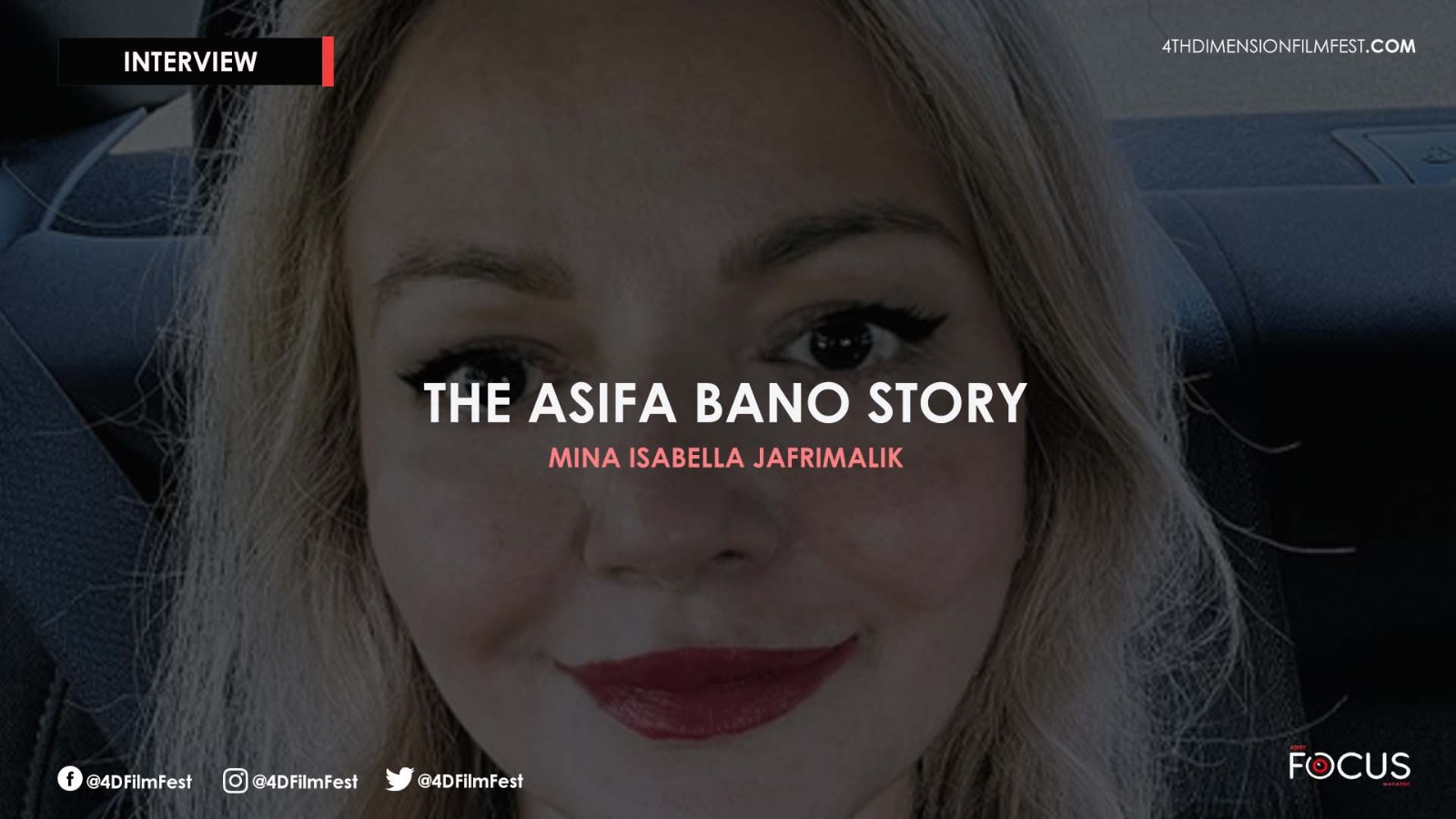Sir tell us something about your love for movies?
“One of my first memories is seeing King Kong on the AMC Channel when I was around four, with my family. It almost felt like magic how this creature was brought to life on screen. Growing up movies were something shared with me and passed down that really shaped my personality. I remember my mom and dad sharing “Monty Python and the Holy Grail” and “Young Frankenstein” with me. I remember wanting to see “Little Shop of Horrors” because it was advertised on TV and the video store only having the 1960’s original in stock, and watching it and being very confused. Superhero movies and comedies became something I bonded over with my older brother. Later I watched Mystery Science Theater 3000 and gathered respect for “B-Movies”. I was around ten years old when I first started playing with my family’s camcorder, playing with stop motion, and later trying to make my own movies with my friends as actors. My school in Rockwood, Tennessee didn’t have many outlets for expressing artistic ventures, which is what led to me attempting to make my own movies. So when I had the opportunity to hire a writer on essayswriting.org to write an essay for me, I definitely did it so that I could have more time for my hobby. I made my own version of Little Shop of Horrors in high school, using a paper mache puppet for the plant’s various sizes. When I was still eighteen I moved from Tennessee to Chicago to pursue my dreams of film and comedy.”
Did comic books and movies based on superheroes entice you since you were a child? Could you tell us more about it?
“Well, my middle name is Clark, so I’ve definitely enjoyed Superman movies and television shows since I was a kid. I also remember seeing the 1989 Tim Burton Batman in theaters. The Joker in that gave me nightmares, but I remember it making an impact on me that you should stand up to bad guys. Aside from that it always touched me that George Reeves’ and Christopher Reeve’s portrayals of Superman always were standing up to bullies. In those movies they didn’t have the budget to create supervillains, so it wasn’t just stopping crime or saving the world, it was often them standing up to someone who was hurting people just because they could. To me that’s the take away from superheroes. Not “go put on a mask and beat people up” but “if you have the power to help someone who doesn’t have the ability to help themselves, then you should help that person”
What do you make of the debate between the MCU and DC? Do you think the debate has created a positive impact for both franchises? If yes, why do you think so?
“I think it’s interesting. I think both franchises have their own merits. Do I like all of the movies by either company? No. Do I hate all of the movies by either company? Also no. I do, personally, prefer movies with a more optimistic outlook, so I’m not really a fan of the darker tone in some superhero films. But I also will concede that some people prefer that. I think that, as long as the debate is kept friendly and there is an understanding that what’s being discussed is subjective it can be positive. When people begin to get heated or angry, or can’t put aside that this is all just storytelling then it’s not healthy. But I do think that as long as art is being created people will always debate the merits. I think it’s just a natural extension of creating art.”
Tell us more about your love for puppets. Where do you see puppet shows going in today’s time?
“I’ve always enjoyed puppets, from The Muppets (I remember seeing the Muppet Movie and the Great Muppet Caper for the first time on tv and falling in love with these films, which led to me watching the muppet show, seeing The Muppet Christmas Carol in theaters, etc.), the use of puppets in films like Gremlins and E.T. to create creatures you wouldn’t see in the real world, etc. I remember seeing the Jim Henson Hour episode that showed the behind the scenes of the Muppets and realizing that puppets were more than just a sock or felt. Several years ago, I began learning the style of puppetry I do today, and building characters. I got a lot of help along the way, including from my good friend Noah Ginex who is an incredible puppeteer in Chicago, and was kind enough to be one of the puppeteers in the opening title sequence of our short. A lot of what I’ve learned over the years both as a performer and builder has come from his advice.

“There are a ton of ways to see puppet shows now. During the pandemic there were many virtual chances to see shows on Zoom and Facebook live. My production partner Peter and I do an improvised show with puppets called “Underhanded Improv” that’s performed at several improv festivals over the years. A great place to support modern puppet arts is the Center for Puppetry Arts in Atlanta, GA. They have amazing exhibits and regularly put on shows. Additionally there are many puppetry guilds connected to the Puppeteers of America, and many of them put on what’s called “Puppet Slams” These are shows that feature multiple puppet companies putting up short puppet pieces that they have been working on to test in front of a live audience. I’ve been lucky enough to work with the Noah Ginex Puppet Company at the Nasty Brutish and Short puppet slam in Chicago, as well as several others.”
Could you recommend us a few of your favorite movies?
“I have so many favorite films it’s hard to keep count, but some of my favorites include (in no particular order)
Little Shop of Horrors
The Great Muppet Caper
Superman the Movie
Spider-Man 2
Spider-Man: Into the Spider-Verse
Army of Darkness
Gremlins 2
Black Panther
Batman: Mask of the Phantasm
Who Framed Roger Rabbit
Beetlejuice
Ghostbusters”
The movie impeccably uses the trope of parody. Tell us something about the origin of the idea behind making the film in the form of a parody.
“The initial idea for the short came to me about nine years ago from a doodle I drew.
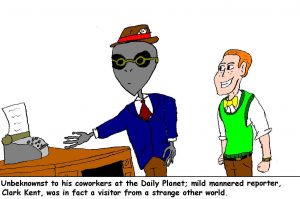
The idea made me chuckle that Clark’s glasses would be all it would take to convince people he wasn’t superman, so I began planning at that time to build a puppet to play the part and film the short. But my skills and tools at that time weren’t quiet polished enough to get the level of professionalism I wanted for the idea so I put it on hold as I refined the puppet design. Around eight years later I felt the puppet finally looked the way I wanted and we began the plan the film. When developing the puppet’s character, I asked my friend Tahnee Lacey, who later on was one of the puppeteers in our film, if she thought it was funnier for the alien to have a normal human voice or speak his own language, she said “his own language” and it just stuck.
In creating the film my biggest inspiration was probably Mel Brooks’ “Young Frankenstein”. I first saw that film when I was seven years old, when my mom and dad had seen it on television the night before and said I had to watch it. The way Brooks and Wilder crafted the film to look and feel like it could have been an actual Universal horror movie, except every once and a while something happens like the Doctor and the Monster sharing the stage for a tap dance routine to Putting on the Ritz or Igor says a one liner. Much of the more adult humor went over my head, but I still loved it. I wanted to take that approach with this film. For the most part it’s played like a sincere episode of The Adventures of Superman, or a Fleischer Superman cartoon, but then Superman and Clark Kent is a little grey alien who speaks in high pitched mumbles, and the only one who realizes it is Lex Luthor.”
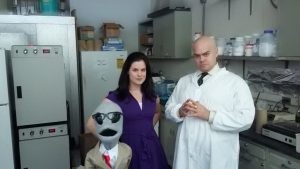
The trope of revealing the secret of a superhero has been used across several spaces and successfully so. It was recently used in the opening scene of Spiderman: No way home. Why do you think the revelation becomes so important for the audience?
“It’s funny. Secret identities and superheroes go back to the beginning of the genre. In a lot of them it’s so they can protect their loved ones while also doing good and helping people. Marvel subverted this trope by ending Iron Man with him stating his name out loud at the end of the film, and most Marvel heroes’ “secret identities” aren’t really secret, except for Spider-Man. So when his identity got exposed in No Way Home, you’re seeing how it’s affecting him and the people he cares about, especially considering Peter Parker isn’t a millionaire industrialist like Tony Stark.
In our film we played with that a bit too. Luthor explains his plan to expose Superman’s secret identity so he’ll ‘Never sleep soundly again!’ which in some ways sounds silly. He’s Superman, his only weakness is Kryptonite, etc. But then there are his friends and family he cares about: Ma and Pa Kent, Lois Lane, Jimmy Olsen, Perry White. All these people would have to deal with the effects of people knowing they’re friends with Superman. So when you think about it, it truly is a scary plan for the villain to have, and luckily in our film, no one can see past the fact that Clark Kent wears glasses and Superman doesn’t.
It is obvious the dialogues, the screenplay was well researched and written. It is full of witty one-liners. Tell us something about the process of writing the screenplay.
“The process for writing the screenplay was very collaborative. I got my start in Chicago improv theaters, specifically The Annoyance, where sketches are written collaboratively through improvisation with the performers, overseen by the director, so this is a very important aspect to my work for me.
Initially I wrote a very short outline of how the film would play out, then reached out to my close collaborator Dustin Levell, and he helped me escalate the humor. It was his idea to treat Lex as a sort of Wile E. Coyote type. From there the first draft was fleshed out, and I showed the script to my production partner Peter Robards who gave notes and made suggestions to punch up lines of dialogue or visual moments. Then I began to cast the short. Derrick Gaetke, who portrayed Lex Luthor, was instrumental in shaping Luthor’s dialogue, rewriting a lot to give it a more comic book feel. Initially, I had cast my assistant director, Joe McDaniel, as the police officer, and he felt he wasn’t right for the part and suggested the actor we went with, Colin Stanley. Colin created the personality and some of the one liners of this character, specifically “Bullets don’t bounce! You call yourself a scientist?”. Initially Luthor was going to be based more on the businessman Lex Luthor of recent comics, but when the best location we could find for his lair became an actual science lab, we reshaped him into more of the mad scientist of the 1940’s to 1970’s. Kat Evans was my first choice for Lois Lane and she and Joe were the two who came up with the idea of Lois being the one to defeat Luthor in the end. One of the toughest parts of completing the film was having to leave some of the improvised jokes on the cutting room floor.”
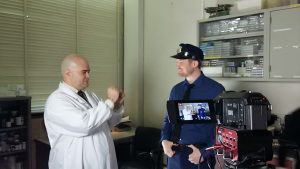
Do you think more superhero films must be made like Deadpool and Shazam, where humor plays a crucial role throughout the narrative?
“I love when superhero films have humor that is crucial to the plot, but I don’t think they must be made that way. Otherwise all films would be kind of the same and become stale. I think it’s great that different superhero movies play to different genres and different people. The most important thing to me is that the film has heart, and that it’s clear that the people making the film really care about the characters and the story they’re telling. I think it’s kind of amazing the variety of films we have. I remember enjoying the quiet, kind of tragic film that was “Logan”, Hugh Jackman’s final Wolverine movie just as much as I laughed really hard at some of the jokes and visual humor in the most recent “The Suicide Squad” film.” I think it’s important that the tone of the movie, from Black Panther to Guardians of the Galaxy, from Wonder Woman to Shazam, fit the characters in the story they’re telling”
The way you have brought puppets and a tale about a popular superhero together is worth appreciating. Do you think going forward more films like these should be made? As this would create more opportunities for puppeteers in the entertainment world and lovers of cinema would enjoy something new and exciting.
“I would love to see more puppetry in films, and in fact I think we’re starting to see it more. I’m excited to see what the next step for The Muppets will be at Disney, but also looking at things like The Mandalorian, and how they incorporated puppetry with Baby Yoda. Puppetry itself is a great practical effect that takes a ton of talent. On top of that, the actors have something physical to interact with. And most puppeteers are really good actors in their own right. Not only are they often providing the voice of the character, but they’re giving it a distinct movement to craft the character in real time on set.
I’d love to see more puppeteers creating their own films, whether short or long, because the more creative work being done, the more variety and the more inspiration is going to feed the community.”
